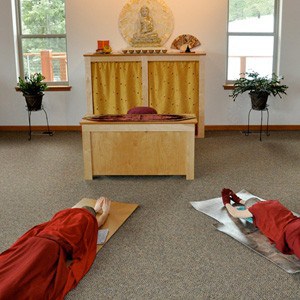What is to be done in between sessions
Part of a series of teachings based on the The Gradual Path to Enlightenment (Lamrim) given at Dharma Friendship Foundation in Seattle, Washington, from 1991-1994.
- Importance of the time in between meditation sessions
- Refraining from engaging in negative actions
- Reflecting on the day in the evening and doing purification practice
LR 007: Between sessions (download)
The time between meditation sessions is also very important—it is as important as what you do during the sessions. If you concentrate well during the session but after the session your mind goes completely bananas and you lose all your energy, then the next time you sit down, you have to start all over again. Keeping your energy together in the periods between sessions is essential.
During the periods between sessions, the most important thing to do is to refrain from committing negative actions. This is one reason for taking precepts and for avoiding the 10 destructive actions. Also, between sessions, do as many positive actions as you can, like making offerings, being kind to other people, helping an old lady cross the street, and so on.
In the morning when you wake up, make your first thought a virtuous one by thinking, “Today, I don’t want to harm anybody. I want to help others as much as possible, and I want to do all my actions today for the enlightenment of myself and others.” Be aware of this motivation throughout the day. Let that motivation permeate your whole day. Then, even if you are not in your meditation session, still, by the force of that motivation, whatever you do becomes virtuous and you are able to keep your energy together and going in a positive direction.
In the evening, before you go to sleep, do some reflection on the day and do some purification practice. When you go to sleep, you can imagine the Buddha on your pillow and put your head in his lap. They say we should lie down in the lion posture — the posture that the Buddha was in when he left his body. You lie on your right side, your right hand under your cheek. If you can block the [right] nostril, this is good. Your left hand is on your left thigh. Your legs are extended. Basically, it’s going to sleep on your right side with your right hand under your cheek. They say that sleeping in this posture helps the energy to flow better. It stops bad dreams and confusion in your sleep.
Also, try and generate a good motivation before you go to sleep. In other words, not going to sleep with just the thought, “I’m exhausted!” but rather, think, “I have to rest my body so that tomorrow I can be healthy and alert. Then I can practice more and benefit more sentient beings from my practice. This is the reason why I am going to sleep.” If you cultivate a good motivation before you go to sleep, it helps the act of sleeping to become a positive action.
Similarly, before you eat, you offer your food. Instead of just shuffling the food into the mouth, we want to be mindful of what we’re doing. Sit down and mentally offer your food. Even if you’re in a crowded place, you can close your eyes for a minute, or you can keep your eyes open while offering the food. What is important is you are aware of what you are doing. You’re making an effort to transform these daily actions.
When you shower, you think you are washing away the suffering and defilements of sentient beings. These are all good to do during the time between meditation sessions.
Venerable Thubten Chodron
Venerable Chodron emphasizes the practical application of Buddha’s teachings in our daily lives and is especially skilled at explaining them in ways easily understood and practiced by Westerners. She is well known for her warm, humorous, and lucid teachings. She was ordained as a Buddhist nun in 1977 by Kyabje Ling Rinpoche in Dharamsala, India, and in 1986 she received bhikshuni (full) ordination in Taiwan. Read her full bio.


